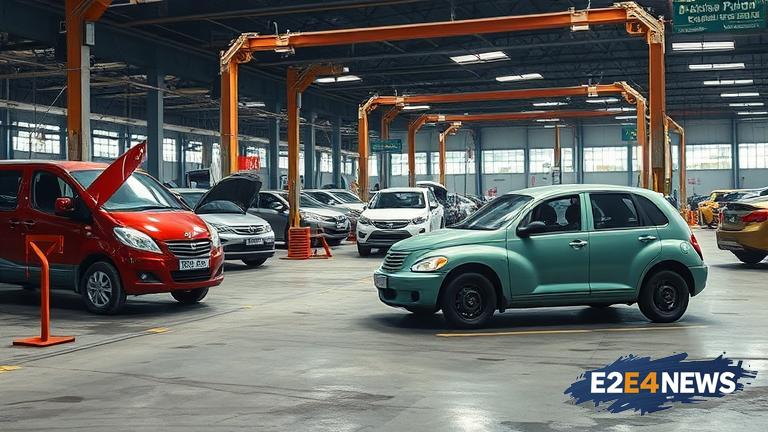Pakistan’s automotive industry, which has been a significant contributor to the country’s economy, is now on the verge of collapse. The industry, which has been facing numerous challenges in recent years, has been further exacerbated by the current economic uncertainty. The Pakistan Automotive Manufacturers Association (PAMA) has warned that the industry is facing a severe crisis, with many manufacturers struggling to stay afloat. The association has attributed the crisis to a combination of factors, including the devaluation of the Pakistani rupee, high interest rates, and a significant increase in regulatory duties. The industry has also been affected by the government’s decision to impose a 10% regulatory duty on imported vehicles, which has led to a significant decline in sales. Furthermore, the industry has been facing challenges in terms of sourcing raw materials, with many manufacturers struggling to access the necessary components. The crisis has also had a significant impact on employment, with many workers in the industry facing the threat of layoffs. The industry has been a significant contributor to Pakistan’s economy, accounting for around 4% of the country’s GDP. However, the current crisis has raised concerns about the industry’s long-term viability. The government has been urged to take immediate action to address the crisis, including reducing regulatory duties and providing support to manufacturers. The industry has also called for a reduction in interest rates, which would help to reduce the cost of borrowing and make it easier for manufacturers to access credit. In addition, the industry has urged the government to provide support for the development of local manufacturing, which would help to reduce the country’s reliance on imported vehicles. The crisis has also highlighted the need for the industry to diversify and develop new products, which would help to reduce its reliance on traditional markets. The industry has also been encouraged to explore new export opportunities, which would help to increase revenue and reduce the country’s trade deficit. Despite the challenges, the industry remains optimistic about its long-term prospects, with many manufacturers investing in new technologies and products. However, the industry has warned that immediate action is needed to address the current crisis, or risk facing a complete collapse. The government has been urged to take a comprehensive approach to addressing the crisis, including providing support to manufacturers, reducing regulatory duties, and promoting the development of local manufacturing. The industry has also called for a reduction in taxes, which would help to reduce the cost of production and make it easier for manufacturers to compete in the global market. In conclusion, Pakistan’s automotive industry is facing a severe crisis, which requires immediate attention from the government. The industry has the potential to make a significant contribution to the country’s economy, but it needs support and investment to overcome the current challenges. The government must take a comprehensive approach to addressing the crisis, including providing support to manufacturers, reducing regulatory duties, and promoting the development of local manufacturing. Only through a concerted effort can the industry be saved from collapse and put back on the path to growth and development. The industry’s collapse would have far-reaching consequences for the economy, including a significant decline in GDP, a rise in unemployment, and a decline in government revenue. Therefore, it is essential that the government takes immediate action to address the crisis and provide support to the industry. The industry’s future depends on it, and the government must act now to prevent a complete collapse. The automotive industry is a significant sector in Pakistan, and its collapse would have a devastating impact on the economy. The government must take all necessary steps to prevent this from happening, including providing financial support, reducing regulatory duties, and promoting the development of local manufacturing. The industry is urging the government to take immediate action, and it is essential that the government responds to this call. The future of the industry, and the economy as a whole, depends on it.
